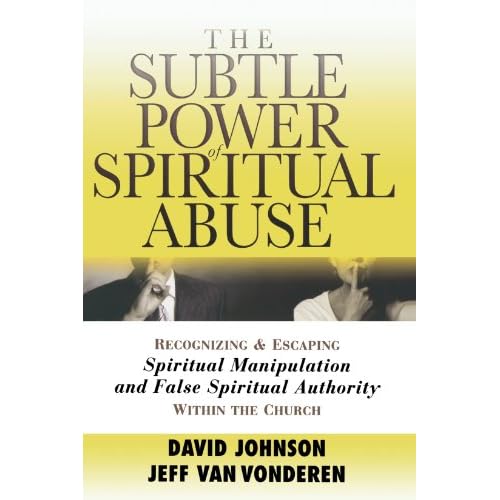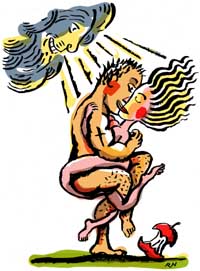My backstory as a Christian is probably not too unique or interesting. Although when I was 'walking away' I felt very isolated and thought I was the only one who had ever gone through it. I later found out how wrong that was.
I was from a non-religious family and 'got saved' in 1984 at 13

years old when a travelling group of musicians came through my school and kicked up some religious fervour. I was later recruited into an Australian Pentecostal cult known as the
Revival Centres International. They are somewhat similar in belief to the
United Pentecostal Church. At 17 I left that group, rather I was kicked out f
or a time for having premarital sex once (yes, once), but I took it as a chance to leave and so never went back.

After a few years of avoiding religion and getting right into the thriving nightlife of my city, my religious guilt and fear of Hell and the devil caught up with me and I eventually joined the more mainstream
Assemblies of God in Australia (AOG) at 20 years old. I was a member of one of the
AOG's flagship churches,
Richmond AOG.

My more mainstream Evangelical church going experience began here.
As I had so many questions regarding my past beliefs and what was being offered by the the
AOG, I started classes at
Harvest Bible College (
AOG) in 1991. This college was very dogmatic in both its course content and delivery. It was not the place for questioning anything. In my church I was a very active member of the youth group, Bible study, street evangelism, welfare outreach and I even sang on stage from time to time.
I started the road to ministry at college and eventually got a position as a youth pastor in the
Geelong AOG and applied for ministerial credential (a years long process). That is a post in itself, but let's just say for now that I saw the dirty side of ministry and the
AOG institution. I was quite disillusioned so I resigned my position but returned to Richmond
AOG.

I eventually married a pastor's daughter, continued with Bible College and started to research the history and beliefs of the Revival Centre cult on my own. As I did this I was able to see not just the history of the cult but the larger history of Pentecostalism in Australia and the world. I guess I believed I would be able to trace this history back to some kind of more pure form of Christianity. However, as I continued my research, I saw that
Pentecostalism's history was littered with scandals,
wacky beliefs and strange practices. This hardly reflected the
AOG party line about the move of God and revival that had supposedly spawned their movement. My disillusionment grew, the 'Pentecostal
distinctives' seemed less and less in line with what I felt the Bible taught, and so I retracted my application for ministerial credential and left the
AOG.

After a brief stint of pew warming at a Baptist church, I hooked up with the
Churches of Christ in Victoria, applied for ministry credential and began a church planting project in the suburbs of Melbourne with my
good friend who is now a missionary to northern Asia. This didn't go as well as I had hoped and so we shut down after about a year and incorporated our group into the urban mission
focused South Melbourne Church of Christ (now apparently known as
Red). It was here that my faith began to be challenged. This church was more progressive than most Evangelical churches and many people there were fed up with Evangelicalism but not ready to step out into Liberalism or leave the church entirely. This church was one of the international epicentres of what has become known as
The Emerging Church Movement. We were, to the pastoral team's benefit, free to explore ourselves and the ins and outs of our faith. Well, to a point anyway.
I had continued my exploration of Church history, having delved back beyond Pentecostalism and into The Great Awakening, The Reformation, etc. Though I couldn't have put it into words at the time, I was searching for some point in history where I could say, "Here it is. Here is a pure form of the faith I can emulate." By this point I had friends who were Methodist, Anglican, Lutheran and other more
traditional forms of Christianity, who were on a similar journey and trying to find and live what one of them had called 'Classical Christianity'.

Now most importantly, this whole time, I was still exploring
aspects of cults and why seemingly intelligent people do the most horrific or even stupid things in the name of religion or at the whim of the cult leader(s). I was also very interested in why people joined and stayed in pseudo-Christian groups like the Mormons and The Jehovah's Witnesses. I began to study these groups in depth, meet with their missionaries, visit their services and even tried my hand at
de-converting members. I spent a lot of money on books, tapes and videos, not all of which were hostile to the groups. I figured the best way to know them was through primary source material. In other words, their own publications. As I came to understand what these groups believed and the worldview they had to adopt in order to
remain as believers, I began to see the
striking similarities between 'them' and 'us'. I recall consciously making the decision not to think about this too much as it made me more than uncomfortable. Eventually, I was forced to be more honest with myself than this as the
cognitive dissonance began to take its toll.

I enrolled in a post graduate Religion and Theology degree at
Monash University with the intent of bettering myself for ministry. It was a secular course but I chose only courses that had a Christian emphasis. After reading the course outlines, my wife commented that I was probably going to lose my faith if I did these subjects. My then mentor,
Alan Hirsch, also suggested I not do the course seeing as I was having trouble finding any relevance in my church experience. His concern for me was genuine but I didn't buy the logic. Surely the truth was not that 'fragile'. Surely the Holy Spirit within me was not so easily spooked.
I was exposed to lecturers who held a more liberal view of Christianity. Some still attended church, others had long since given it up. All impacted me with what they had to say. My Hermeneutics subject did not parrot the dogmatic Evangelical 'rules' of Hermeneutics but rather looked back through history at different ways key figures in church history had interpreted the Bible. We also looked at postmodernism and its philosophical objections to
inerrancy. For assessment in that subject, I wrote a paper that 'debunked' the
AOG in Australia's statement of faith concerning
inerrancy. That was it for me. I no longer held a fundamentalist theology of the Bible. In 1999, four years of Bible college indoctrination came crashing down after just one semester at a secular university.


I didn't totally abandon the faith for another six years after that. I tried to flirt with Liberal Christianity for a while by reading
Marcus Borg,
John Spong and briefly attended a Liberal Catholic parish. Nothing seemed to gel with me. It all seemed so hollow, so empty, so meaningless. I eventually started a brief dialogue with
Robert M. Price who really helped me with some of my less rational fears about 'walking away'.

Bob said something like, "If God really existed then he wouldn't be fooled. If you don't believe then you don't believe. Admit it and get on with your life." So, in 2005, I came to a place where I was finally able to say I did not believe anymore. I was also able to say that I had, in fact, not believed for years and had been kidding myself. Like I said earlier, the cognitive dissonance was a bitch.
I am now a teacher and have remarried. I know this is going to sound trite, but I am truly the happiest I have ever been since my teens. I have reestablished meaningful relationships with my non-Christian family, assigned meaning to the everyday and began to live life in the here and now and not for some 'pie in the sky when you die'.
 OK, so who says we can't leave the faith because of the misdeeds of the Church?
OK, so who says we can't leave the faith because of the misdeeds of the Church?  We all know of the televangelists who fleece the flock, but what of that which is has now been termed spiritual abuse? What of those who have their self esteem crushed, their decision making skills diminished, their critical reasoning skills stunted? We're not talking here about cults. No, spiritual abuse is something Evangelicals admit goes on in their churches all the time. Authoritarianism, manipulation, guilt and shame, are, and have always been, rife in the Church. So is the Church really such a good place for anyone to be? More than that, where is the Christian God in all this? If the Church is truly his body, then why are so many people so badly damaged by it? Where' does the Christian God's responsibility lie in all this?
We all know of the televangelists who fleece the flock, but what of that which is has now been termed spiritual abuse? What of those who have their self esteem crushed, their decision making skills diminished, their critical reasoning skills stunted? We're not talking here about cults. No, spiritual abuse is something Evangelicals admit goes on in their churches all the time. Authoritarianism, manipulation, guilt and shame, are, and have always been, rife in the Church. So is the Church really such a good place for anyone to be? More than that, where is the Christian God in all this? If the Church is truly his body, then why are so many people so badly damaged by it? Where' does the Christian God's responsibility lie in all this?
























 Originally
Originally 
